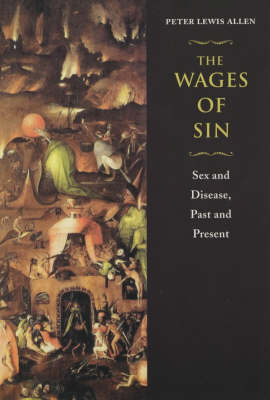
The Wages of Sin
Sex and Disease, Past and Present
Seiten
2002
University of Chicago Press (Verlag)
978-0-226-01461-6 (ISBN)
University of Chicago Press (Verlag)
978-0-226-01461-6 (ISBN)
Throughout history, Western culture has often viewed disease as punishment for sin. "The Wages of Sin" offers a remarkable history of this perception and explains how these ancient views continue to shape contemporary life and public policy.
Near the end of the century, a new and terrifying disease arrives suddenly from a distant continent. Infecting people through sex, it storms from country to country, defying all drugs and medical knowledge. The deadly disease provokes widespread fear and recrimination; medical authorities call the epidemic "the just rewards of unbridled lust"; a religious leader warns that "God has raised up new diseases against debauchery." The time was the 1490s; the place, Europe; the disease, syphilis; and the religious leader was none other than John Calvin.
Throughout history, Western society has often viewed sickness as a punishment for sin. It has failed to prevent and cure diseases—especially diseases tied to sex—that were seen as the retribution of a wrathful God. The Wages of Sin, the remarkable history of these diseases, shows how society's views of particular afflictions often heightened the suffering of the sick and substituted condemnation for care. Peter Allen moves from the medieval diseases of lovesickness and leprosy through syphilis and bubonic plague, described by one writer as "a broom in the hands of the Almighty, with which He sweepeth the most nasty and uncomely corners of the universe." More recently, medical and social responses to masturbation in the eighteenth and nineteenth centuries and AIDS in the twentieth round out Allen's timely and erudite study of the intersection of private morality and public health. The Wages of Sin tells the fascinating story of how ancient views on sex and sin have shaped, and continue to shape, religious life, medical practice, and private habits.
Near the end of the century, a new and terrifying disease arrives suddenly from a distant continent. Infecting people through sex, it storms from country to country, defying all drugs and medical knowledge. The deadly disease provokes widespread fear and recrimination; medical authorities call the epidemic "the just rewards of unbridled lust"; a religious leader warns that "God has raised up new diseases against debauchery." The time was the 1490s; the place, Europe; the disease, syphilis; and the religious leader was none other than John Calvin.
Throughout history, Western society has often viewed sickness as a punishment for sin. It has failed to prevent and cure diseases—especially diseases tied to sex—that were seen as the retribution of a wrathful God. The Wages of Sin, the remarkable history of these diseases, shows how society's views of particular afflictions often heightened the suffering of the sick and substituted condemnation for care. Peter Allen moves from the medieval diseases of lovesickness and leprosy through syphilis and bubonic plague, described by one writer as "a broom in the hands of the Almighty, with which He sweepeth the most nasty and uncomely corners of the universe." More recently, medical and social responses to masturbation in the eighteenth and nineteenth centuries and AIDS in the twentieth round out Allen's timely and erudite study of the intersection of private morality and public health. The Wages of Sin tells the fascinating story of how ancient views on sex and sin have shaped, and continue to shape, religious life, medical practice, and private habits.
Peter Lewis Allen, a writer living in New York, has a Ph.D. in comparative literature from the University of Chicago and an M.B.A. from the Wharton School or the University of Pennsylvania.
| Erscheint lt. Verlag | 12.8.2002 |
|---|---|
| Sprache | englisch |
| Maße | 15 x 23 mm |
| Gewicht | 340 g |
| Themenwelt | Geschichte ► Teilgebiete der Geschichte ► Kulturgeschichte |
| Medizin / Pharmazie ► Medizinische Fachgebiete ► Dermatologie | |
| Studium ► Querschnittsbereiche ► Geschichte / Ethik der Medizin | |
| Sozialwissenschaften ► Ethnologie | |
| Sozialwissenschaften ► Soziologie | |
| ISBN-10 | 0-226-01461-4 / 0226014614 |
| ISBN-13 | 978-0-226-01461-6 / 9780226014616 |
| Zustand | Neuware |
| Haben Sie eine Frage zum Produkt? |
Mehr entdecken
aus dem Bereich
aus dem Bereich
der stille Abschied vom bäuerlichen Leben in Deutschland
Buch | Hardcover (2023)
C.H.Beck (Verlag)
23,00 €
vom Mittelalter bis zur Gegenwart
Buch | Softcover (2024)
C.H.Beck (Verlag)
12,00 €


